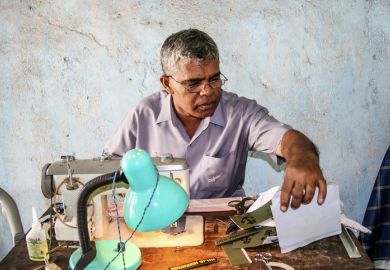On 27 June, Alastair Hall, a 22-year-old radiography student at the University of Portsmouth, was found dead in his room in student halls. He had killed himself.
A month earlier, the university had launched an investigation into suspected plagiarism in Alastair’s final-year dissertation. He was alleged to have copied parts of an example essay in his work. In a university hearing, Alastair denied the offence but was found guilty and awarded a mark of 0 for academic misconduct. At the inquest, the coroner concluded that the allegation of plagiarism had contributed to his death.
Alastair’s suicide should be a wake-up call to UK universities, one all the more urgent given the rise in allegations of cheating during the Covid pandemic. Those accused must be better supported.
Too often, students accused of academic misconduct are treated like convicted criminals. Some are not told what they are accused of until they are ambushed by secret evidence in so-called “informal” hearings. As a lawyer who acts for students accused of misconduct, I have seen academics, sitting as judges, laugh dismissively at students in hearings. I have seen them make awful and life-changing decisions that can be hard and time-consuming to reverse. Unlike real judges, they have no legal training.
The standard required to find a student guilty is merely “the balance of probabilities” rather than “beyond reasonable doubt”, even though a guilty verdict could result in expulsion and affect the student’s future employment.
Many students face such accusations with no representation. Students’ union officers are often unavailable, especially during holidays – and, frankly, they are of limited use to students anyway due to their lack of time and training. Yet universities dissuade accused students from seeking external legal advice, and most prohibit legal representation at hearings. “It won’t help you”, they say. “There’s no need”.
The truth is that a specialist lawyer will probably help, through advice, drafting and representation, but also by providing psychological support. Many students have mental health problems (as did Alistair). Some are isolated and alone. Others speak poor English. I have had clients in tears, petrified at the prospect of writing a defence statement or appearing at a hearing. Many clients have told me and my colleagues that they feel “safe and reassured” with us.
An enlightened university should offer all accused students expert representation, advice and support – perhaps by increasing funding to students’ unions, allowing them to hire legally qualified staff and offer better training for advisers.
Some academics might baulk at the idea of adding more cost and complexity to the policing of misconduct, especially when there is apparently so much of it about. But no matter how prevalent cheating is, all accused students, whether innocent or guilty, deserve to be treated fairly and humanely.
Moreover, contrary to popular opinion, lawyers do not get students off on “technicalities”. Lawyers promote justice by ensuring that the fundamental rules of fairness are followed. They help students identify and articulate arguments, gauging the strength of their case. A student with a lawyer is much less likely to run a hopeless, time-wasting case than a student without one. For students who have cheated, lawyers explore any mitigating factors and advise on how to present these effectively.
The extra cost of providing expert advice may well be offset by the reduction in appeals, complaints, cases brought to the Office of the Independent Adjudicator and litigation. But even if such support results in a net cost, that is the price of a system that is fair to accused students and sensitive to their challenges and mental well-being.
In my 10 years in this job, I have not met a single lawyer acting for students who thinks highly of UK universities’ justice systems. At present, it would be more accurate to describe them as injustice systems. With few exceptions, the quality of investigation and decision-making is poor. What is worrying is that universities do not recognise their mediocrity in this area. Like dictators of failed states, university leaders believe their system is just and efficient.
Every person involved in the academic misconduct process should undergo rigorous training, including in the principles of natural justice, how to conduct fair investigations and hearings, and how to deal with emotionally fragile and vulnerable people. The training should be delivered by lawyers, judges, psychologists and other professionals, not administrative staff.
Universities should also apply the presumption of innocence and remember the oft-forgotten fact that cheating in an exam is fairly low in the hierarchy of human wrongs. Most students who cheat are decent young people under pressure to do well who, through a lapse in judgement, succumb to a temptation currently made greater by the ease of cheating in at-home, online exams. They are not murderers or violent offenders.
I am not calling for universities to “go easy” on students who cheat. But the punishment, imposed after a fair and respectful process in which the student felt heard and supported, should fit the crime and the student’s particular circumstances.
Within the miniature world of the university, where little things take on disproportionate importance, it is easy to lose sense of perspective. A student killing himself: that is important. And unless things change fast and drastically, other students will be pushed over the edge by the stress of mishandled allegations of cheating.
Daniel Sokol is a barrister and founder of Alpha Academic Appeals, where he leads a team of 15 barristers who act for students accused of misconduct. He was formerly a university lecturer.
Register to continue
Why register?
- Registration is free and only takes a moment
- Once registered, you can read 3 articles a month
- Sign up for our newsletter
Subscribe
Or subscribe for unlimited access to:
- Unlimited access to news, views, insights & reviews
- Digital editions
- Digital access to THE’s university and college rankings analysis
Already registered or a current subscriber? Login








